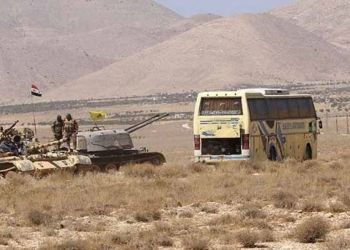This post is also available in:
![]() العربية
العربية
 13330529_1639692802936002_1096454839_n-300×170Hussein Abu Sultan, also known as Abu Ghanam, was born in the village of Abu Hamam in the area of Shaitat, Deir Ezzor’s eastern countryside, and like any of other individual from his region, he left his village for Kuwait to earn a living. However, he neither overlooked nor neglected his responsibility and duty towards his native nation, as he became a part of the Syrian Revolution while coincidently being on vacation in Deir Ezzor province when it erupted in 2011.
13330529_1639692802936002_1096454839_n-300×170Hussein Abu Sultan, also known as Abu Ghanam, was born in the village of Abu Hamam in the area of Shaitat, Deir Ezzor’s eastern countryside, and like any of other individual from his region, he left his village for Kuwait to earn a living. However, he neither overlooked nor neglected his responsibility and duty towards his native nation, as he became a part of the Syrian Revolution while coincidently being on vacation in Deir Ezzor province when it erupted in 2011.
After the Syrian Revolution commenced, Abu Ghannam immediately began to organize protests demanding the overthrow of the oppressive and dictatorial regime in Al-Shaitat region; and coordinated with other protesters in villages surrounding his area in order to broaden the anti-Assad protest movement. He was also the representative of the people of his region during revolutionary meetings due to his pluckiness, intellect and awareness.
Abu Ghannam’s name became widespread and popular amongst civilians in rural Deir Ezzor, as he was not working against the regime on secret, which would expose him to several attempts of arrest later. His name was also blacklisted in the regime’s wanted list of those living in the area of al-Shaitat. As a result, the Assad-regime conduced several raids on villages in the area of al-Shaitat during which the house belonging to Abu Ghannam was a top priority over other houses, which were raided, destroyed and looted. Assad forces went even further by stealing his car after the failure of several attempts aiming to arrest him.
As the pace of events intensified in Deir Ezzor following the employment of weaponry against the protestors by Assad forces, Abu Ghannam had to shift his activities from peaceful protests to military operations in an attempt to defend his brethren and prevent Assad forces from reaching the yards where the protests were taking place at the time. He embarked on coordination with some military commanders who were operating in neighboring villages; among them were Abu Mohamed Salim from the city of Al-Shaheel. Their focal point in the beginning was focused on delivering heavy blow to the regime by conducting sudden raids against its check posts and barracks in all the cities of Mayadine, al-Bassira, Tayana as well as the Tanak oil field in the eastern countryside of Deir Ezzor.
Their military operations were merely small sized raids aimed at exhausting and draining Assad forces; the case was as such due to scarcity of weaponry and ammunition and the absence of any sponsors as well as a lack of manpower. With the escalation in the pace of military operations, it was suggested to Abu Ghannam to form a military faction in order to be more decisive and effective in thwarting and countering the military campaigns launched by the Assad-regime. Therefore, he became one of the founders of the battalion of Assud al-Jazzra (The Lions of Al Jazeera), which is regarded among the first military factions that operated in Deir Ezzor province. The battalion had fought and succeeded in gaining control over multiple decisive and key villages in rural Deir Ezzor until Jaafar Tayar brigade came into being as a result of the unification of several battalions; on top of them the battalion of Hamza led by Abu Ghanam. The brigade partook in all battles that resulted in the liberation of several leading areas in Deir Ezzor province.
The Assad-regime moved heaven and earth to either arrest or assassinate Abu Ghannam; in doing so, the regime tasked some ignorant people with assassinating him in the region where he was active. The first essay of assassination took place in 2012 when a group of unknown gunmen riding a motorbike unsuccessfully fired bullet at Abu Ghannam in one of the villages. The regime continued to plot his assassination by sending a group of unknown men who threw an IED in one of the houses in Shaitat where a meeting was taking place between commanders of the region. Abu Ghannam survived and only sustained a light injury in the IED explosion.
These different attempts of assassinations only stepped up his willpower to hold fast to the cause of the Syrian Revolution, as he was present in all battles that took place in his region in which several villages and checkpoints were liberated. Most important of all, he took part in the intense battles in the area of Al Kabr al Nawawi in 2013, which ended with its liberation. However, after a couple of hours, Abu Ghanam walked into a minefield in the area and triggered a landmine to fall martyr along with his nephew. Thus the life of an honest and upright rebel, who was a source of strength to the revolution of the people in Syria, ended.









